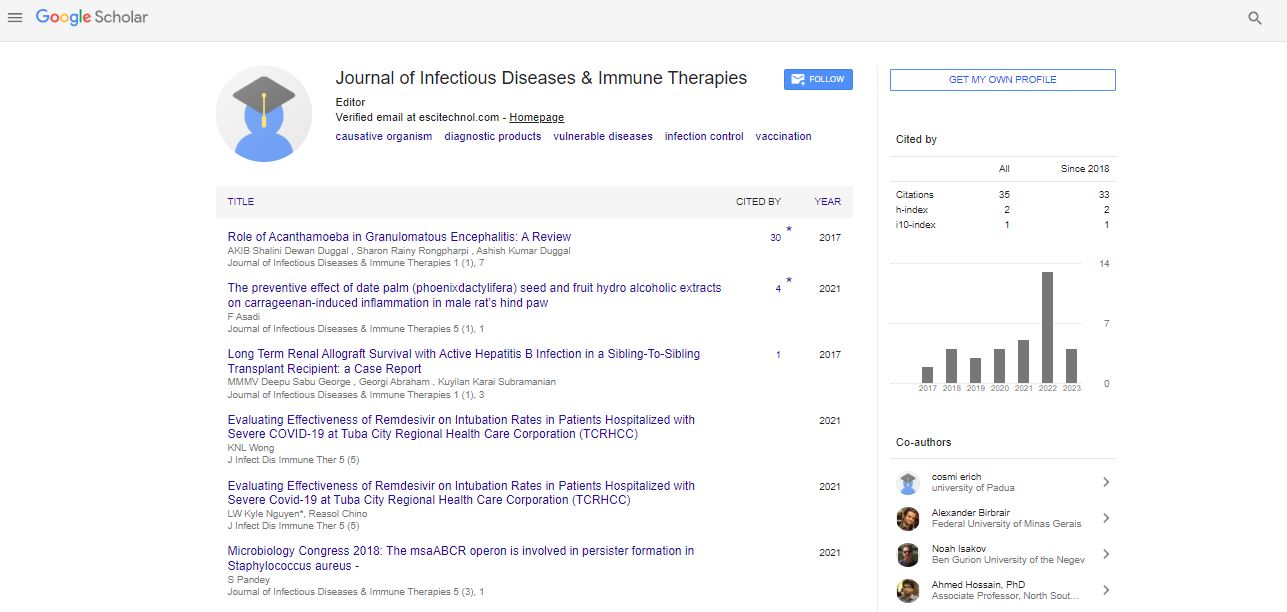Opinion Article, J Infect Dis Immune Ther Vol: 7 Issue: 1
The Complications of Intestinal Diseases
Atrin Goncalves*
Department of Surgery, Baylor University Medical Center, Dallas, United States of America
*Corresponding Author: Atrin Goncalves
Department of Surgery, Baylor University Medical Center, Dallas, United States of America;
E-mail: atrincalve@bumc.org
Received date: 03 February, 2023, Manuscript No. JIDITH-23-93628;
Editor assigned date: 07 February, 2023, PreQC No. JIDITH-23-93628 (PQ);
Reviewed date: 21 February, 2023, QC No. JIDITH-23-93628;
Revised date: 28 February, 2023, Manuscript No. JIDITH-23-93628 (R);
Published date: 07 March, 2023, DOI: 10.4172/JIDITH.1000151
Citation: Goncalves A (2023) The Complications of Intestinal Diseases. J Infect Dis Immune Ther 7:1.
Description
Intestinal diseases are a group of disorders that affect the digestive system, including the esophagus, stomach, small intestine, colon and rectum. These diseases can be chronic, debilitating and affect a person's quality of life. Common intestinal diseases include Inflammatory Bowel Disease (IBD), Crohn's disease, ulcerative colitis, Irritable Bowel Syndrome (IBS), celiac disease and diverticulitis. Symptoms of intestinal diseases can vary depending on the specific disorder but may include abdominal pain, diarrhea, constipation, bloating and fatigue. Treatment for intestinal diseases may include medication, dietary changes, lifestyle modifications and in some cases, surgery.
Complications of intestinal diseases
Intestinal diseases can cause a wide range of complications, including:
Malnutrition: Patients with intestinal diseases may have difficulty absorbing nutrients from their food, which can lead to malnutrition. This can result in weight loss, fatigue, weakness and other health problems.
Dehydration: Chronic diarrhea, a common symptom of intestinal diseases, can lead to dehydration if not properly managed. Dehydration can cause weakness, dizziness and other complications.
Fistulas: Intestinal fistulas are abnormal connections between different parts of the intestine or between the intestine and other organs. Fistulas can cause infection, pain and other complications.
Perforation: IBD and other intestinal diseases can cause the intestinal wall to become inflamed and weakened, leading to perforation (a hole in the intestine). Perforation can cause sepsis, a lifethreatening infection.
Colon cancer: Patients with IBD are at increased risk of developing colon cancer. Regular screening and monitoring are essential for early detection and treatment.
Challenges for patients, caregivers and healthcare professionals
Intestinal diseases can pose significant challenges for patients, caregivers and healthcare professionals. Some of the challenges include:
Emotional and psychological impact: Intestinal diseases can be chronic, debilitating and affect a person's quality of life. The emotional and psychological impact of these diseases can be significant and patients may require support from family, friends and mental health professionals.
Management of symptoms: Intestinal diseases can cause a wide range of symptoms, including pain, diarrhea, constipation and fatigue. Managing these symptoms can be challenging and may require a multidisciplinary approach, including medication, dietary changes and lifestyle modifications.
Medication management: Patients with intestinal diseases may require long-term medication to manage their symptoms and prevent complications. Managing medication can be challenging and patients may need assistance from caregivers and healthcare professionals to ensure adherence to treatment plans.
Nutritional support: Patients with intestinal diseases may require nutritional support to maintain their health and prevent malnutrition. Nutritional support may include dietary changes, supplements and in some cases, tube feeding or intravenous nutrition.
Access to care: Patients with intestinal diseases may require frequent visits to healthcare professionals and hospitalizations. Access to care can be challenging, particularly for patients who live in rural or remote areas.
Conclusion
Intestinal diseases can cause a wide range of complications and pose significant challenges for patients, caregivers and healthcare professionals. The emotional, psychological and physical impact of these diseases can be significant and patients may require support from a multidisciplinary team of healthcare professionals. Improving access to care, developing effective treatments and providing support for patients and caregivers are essential for improving outcomes and quality of life for people with intestinal diseases.
 Spanish
Spanish  Chinese
Chinese  Russian
Russian  German
German  French
French  Japanese
Japanese  Portuguese
Portuguese  Hindi
Hindi 